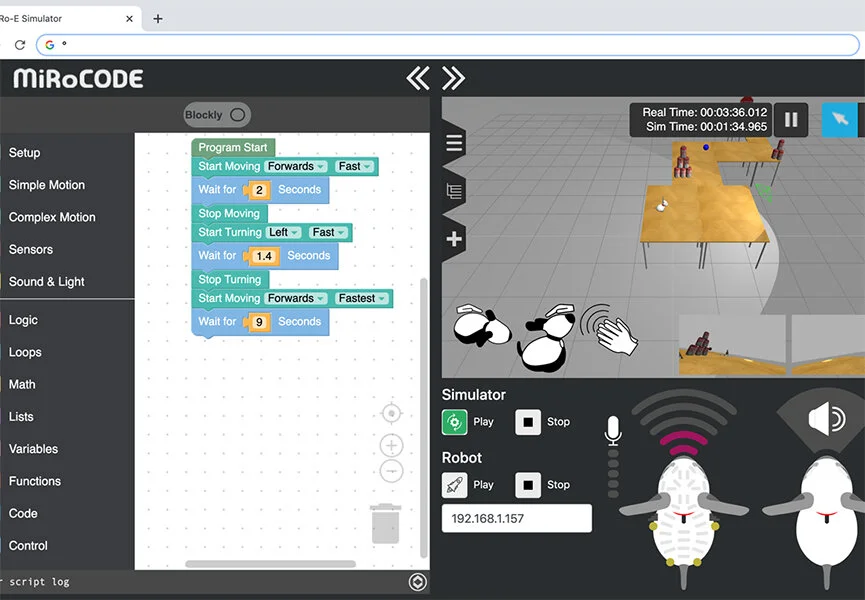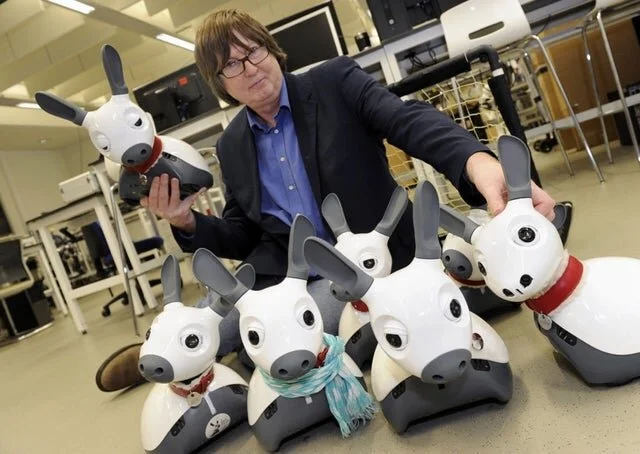We are delighted that MiRo is being used in the exciting new distance learning project led by the University of Sheffield’s Department of Computer Science.
Achieving equality and diversity is a key priority
The project who will be working with schools that have high numbers of children from disadvantaged backgrounds and pupils with special educational needs. Its goal is to help more of those who are currently under-represented in robotics to develop skills in robotics and autonomous systems; close the skills gap and drive forward productivity in the UK.
To address the inequalities in the robotics and autonomous systems industry, the project will provide positive and diverse role models together with the resources needed to help young people from disadvantaged backgrounds to go on and develop the skills to study and establish a career in the industry. Led by Professor Tony Prescott, Professor of Cognitive Robotics from the University of Sheffield; Tony and his team will use cloud computing and state-of-the-art robots to develop distance learning activities in robotics for people across all educational levels.
Dr Becky Parry, School of Education, University of Sheffield.
Dr Becky Parry from the University’s School of Education is leading on ensuring the inclusivity outcomes of the project. Dr Parry said: “As a society, and in response to the rapid development of new technologies, we need new voices to help us imagine the potential value they will have to our lives. This project will be designed so that children can experience working in robotics as coders, designers or researchers and therefore imagine themselves in these roles in the future.
The researchers and students involved in running the project will seek to provide positive and diverse role models which we know are key to children making decisions about the subjects they are interested in. In the current climate it is heartening to be part of a project which attempts to address structural inequalities in the short-term but also in terms of imagining the potential of robotics in the future to help us address the big issues of our times.”
Professor Prescott added: “We hope that the new distance learning project will help us to develop scalable approaches for plugging the skills gap, then we can work together with schools, universities, industry and policy makers to roll this out across the UK.”
Piloting a new way of learning in robotics education
The project will tap into the interactive and emotionally engaging qualities of the MiRo robot and use MiRoCLOUD, the cloud-based educational software to teach coding remotely. This will enable students to write programs from home, test them using the MiRoCLOUD simulator, and then run the program on MiRo to see if it works in the real-world. Beginners can program a robotic simulation using the graphical language Google Blockly while more advanced students can program with the widely used Python language. This is a new approach to robotics teaching that is being piloted for the first time in Sheffield.
The cloud-based simulation, MiRoCLOUD, will enable school pupils at both primary and secondary school levels to program a MiRo robot from home with the help of distance learning materials, tests, resources and lesson plans that are being developed by the University of Sheffield-led team.
Professor Tony Prescott, Professor of Cognitive Robotics, University of Sheffield.
Professor Tony Prescott said: “The Covid-19 pandemic has left the UK with an urgent need to kick start its economy and boost productivity. A key to doing this will be increased automation and deploying the next generation of robotics and autonomous systems in industry.
If we are to use more robots and autonomous systems, then we need more people who have the skills to use these technologies. We need to encourage people from a young age to consider studying and developing careers in robotics while also providing the resources and the systems that will inspire young people and give them the platform they need to succeed. We also need to help the current workforce retrain and develop the skills they need to secure employment after the Covid-19 pandemic.”
The team will also work with DiscoveryStem.org.uk, a Sheffield-based educational consultancy that is at the forefront in developing schools teaching in robotics, to develop and share learning resources with primary and secondary schools across the UK. In the Sheffield City Region, the researchers will work in partnership with Beck Primary School - a large inclusive Sheffield school.
The distance learning project is linked to a national task group - Skills and Education in Robotics and Autonomous Systems, supported by the UK EPSRC Robotics and Autonomous Systems Network, that is preparing a White Paper on how to transform the UK’s skills in robotics and autonomous systems.
Read the full article from the University of Sheffield here.





